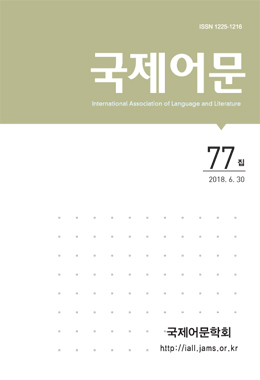이 글은 1936년 최재서가 일본어로 번역한 이태준의 「櫻は植えたが(원제: 꽃나무는 심어놓고)」와 박화성 「旱鬼(원제: 한귀)」를 원작과 비교해 그 표현의 특징과 최재서의 의도에 대해 고찰한 것이다. 최재서는 「한귀」 번역본에서 여성인물의 어투를 도시적으로 바꾼 반면 남성인물에게는 사투리를 사용하게 하고, 글을 읽을 줄 아는 농민임을 숨겼다. 최재서는 남성인물을 순박하고 도덕적인 농부로, 여성인물을 지적이지만 가뭄으로 인해 토속신앙에 빠지고 만 아내로 표현했다. 그것은 일본인 독자의 조선인에 대한 멸시감정을 의식한 결과일 것이다. 「꽃나무는 심어놓고」에서는 주인공이 실향하는 원인인 악덕지주가 일본인임을 복자로 숨기지만 그것은 그 밖의 부분에서 복원이 가능하기도 하다. 최재서는 제국의 탄압과 작가의 사명 사이에서 타협점을 모색했다. 최재서의 「한귀」 번역본에서 등장인물을 주로 일반명사로 서술되며 이는 독자와 등장인물의 거리를 멀어지게 하고 있다. 이 거리는 최재서가 느끼고 있는 일본인과 조선의 거리이기도 했을 것이다.
This article compares Lee Tae-jun’s “Planted Flower Trees” and Park Hwa-seong’s “Drought-god” translated by Choi Jae-seo into Japanese in 1936, to explore the characteristics of the expression and Choi Jae-seo’s intention. While Choi Jae-seo changed the tone of female characters to urban in the translation of “Drought-god” in Japanese, he used a regional dialect for the male characters and hid the asset of the farmer who could read the text. While Choi Jae-seo expresses the male character as a simple, moral farmer, the woman character is expressed as an intellectual, but, she is expressed as a wife falling into a totem faith because of the drought. It may be the result of being conscious of the contempt that the Japanese readers might have against Joseon-people. In the “Planted Flower Trees”, he hides the fact that the evil landlord, who is the cause of hero’s departure, is a Japanese as he deliberately uses an inverted-black-type, but it can also be restored from other parts. Choi Jae-seo sought a compromise between the repression of the empire and the writer’s mission. In Choi Jae-seo’s translation version of “Drought-god”, the characters are mostly marked as a general noun, which causes to get the distance between the readers and the characters. It would have been the distance between the Japanese and the Joseon people that Choi Jae-seo felt.


